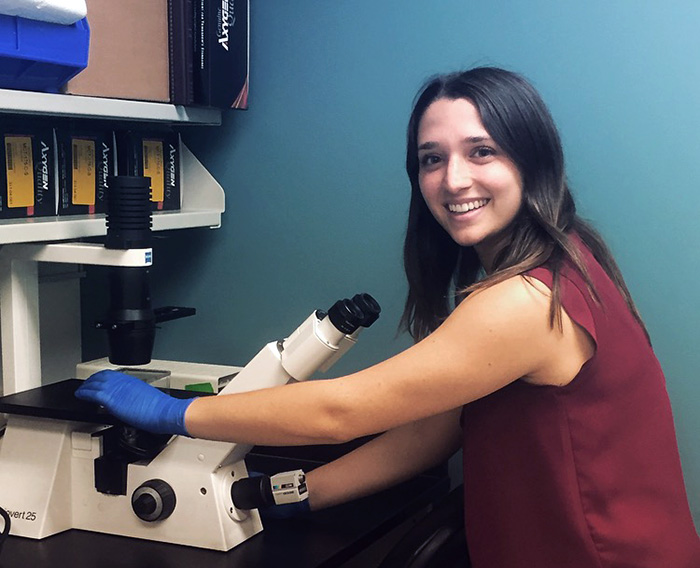Discovering Research

Madi McDole ’18, Johns Hopkins Drug Discovery
Major:
Biochemistry & molecular biology.
Internship title:
Laboratory technician.
How I got this internship:
I attended a lecture by Barbara Slusher ’86, P’16 and became interested in the work she does at Johns Hopkins. I spoke to her after the lecture and discussed my interest in getting research experience, and she sent out my resume to researchers in her lab. One scientist, Dr. Mike Nedelcovych, offered me the opportunity to intern for him this summer.
What I do, day to day:
I typically arrive at the lab at 9 a.m. and work until around 5 p.m. I alternate working on running assays, growing bacteria, doing cell culture and working with animal models. Every month, the lab holds meetings to discuss progress and present new data. It is very interesting, because everyone in the lab, around 20 people, are working on different aspects of the same project. During these meetings, I get to see how my data fit into the grand scheme. There are also seminars at Johns Hopkins Medical School that I attend.
About my research:
My research involves finding an animal model for the HIV virus by synthesizing the compound, processing DNA and doing tests/directions of mice. Specifically, I am looking for a model that illustrates glutamine levels that are similar to those shown in humans with HIV. The HIV virus causes the levels of the protein glutamine to rise significantly in the body, especially in the brain. This excitotoxicity is seen to cause neuronal damage. In theory, limiting the release of glutamine in the brain via the blockage of glutamate receptors would stop the damage and effect of neurocognitive disorders (HAND). The purpose is to potentially find a treatment for HIV associated with HAND.
Why it’s important:
The vast majority of HIV-positive patients observe the effects of HAND, ranging from memory loss to severe pain, due to nerve damage. Although there has been a lot of progress on prolonging the life of HIV patients, millions suffer for decades due to the limited research on HAND treatments. The long-term hope for the research is that the animal model can be used to test treatments. With a successful cure, HIV-positive patients will not only live longer but be able to lead a healthy, normal life.
Previous internships:
This has been my first opportunity to intern, but I definitely hope to do it again. If possible, I would love to return to the drug discovery team next summer. I’m also considering working in a professor’s lab at Dickinson.
Most valuable part of this experience:
The most valuable part of this internship has been seeing the concepts I've learned in my courses actually applied in the field. As a biochemistry & molecular biology major, I've taken classes in almost every science course, from biology to physics. I often questioned how everything I learned would be used in a profession. My internship has showed me that everything I have learned is interrelated and used on a daily basis in a research career. From the math I use to calculate concentrations to the anatomy background of the mice, I consolidate material from all my courses. It was amazing to see that Dickinson really prepares students for a career in science.
Advice for students considering internships:
Definitely do it! There is no better way to know if you want a future in a career than stepping into it for a summer. Whether you confirm how much you want a certain path or decide that it isn't for you, the experience will help you plan your life after Dickinson.
How this internship has helped me:
This internship has sparked my interest in research. When I return to Dickinson, I would love to aid in a professor's research during the semester or summer. The lab techniques that I have learned will also help me in my courses and prepare me for medical school.
Post-Dickinson plans:
After I graduate from Dickinson, I plan to attend medical school on the path to becoming a dermatologist. This opportunity has also led me to consider doing some form of research later in my life.
Learn more:
- “Self-Discovery” (Barbara Slusher ’86, P’16)
- Interns in Action
- Department of Biochemistry & Molecular Biology
- Research News
- Alumni in Action: Science and Medicine
- Latest News
Published July 29, 2016